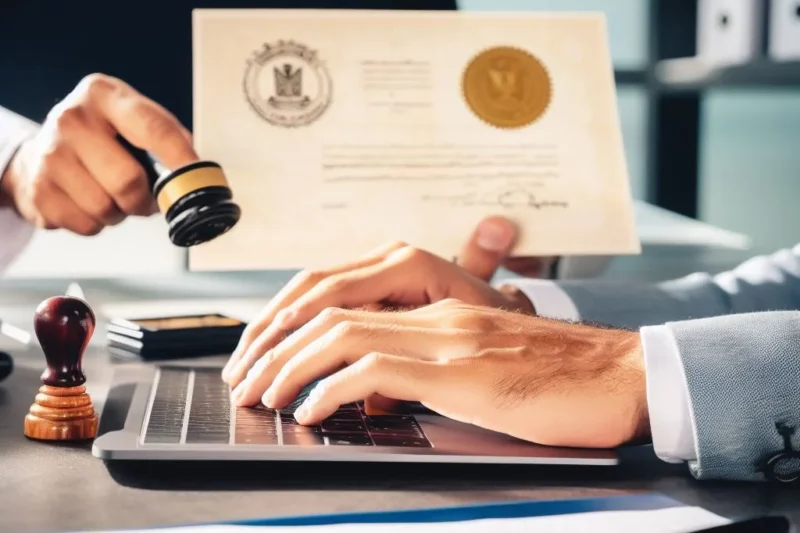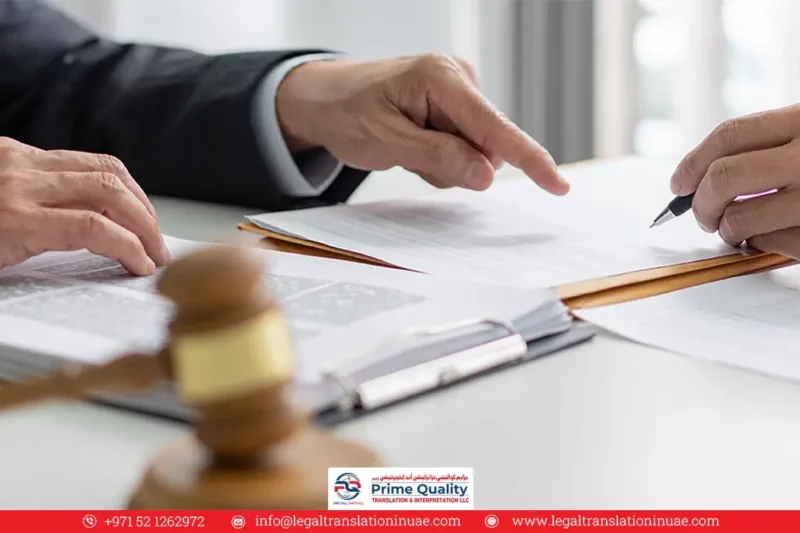
Legal translation is a critical service for financial transactions, especially in a global hub like Dubai, where lenders and borrowers often deal with multilingual contracts, agreements, and legal documents. Whether you're securing a loan, finalizing a mortgage, or entering into a financial agreement, accurate legal translation Dubai ensures compliance with UAE laws and prevents misunderstandings.
In this guide, we'll explore everything lenders and borrowers need to know about legal translation Dubai—why it's important, the types of documents involved, certification requirements, and how to choose the right translation service.
What is Legal Translation?
Legal translation is the process of translating legal documents from one language to another, ensuring that the legal meaning, context, and terminology are preserved.
In Dubai, where Arabic is the official language, legal translations are especially critical. Any document submitted to government entities or courts must be in Arabic or legally translated into Arabic by a certified translator licensed by the UAE Ministry of Justice.
Who Can Perform Legal Translation Dubai?
Only licensed legal translators approved by the UAE Ministry of Justice, like Prime Legal Translation, are authorized to provide legal translations that are accepted by Dubai's government entities.
Tip: Always ask for the translator's MOJ license number before proceeding.
Why Legal Translation is Essential for Lenders & Borrowers in Dubai
Dubai's legal system operates primarily in Arabic, making it mandatory for all official documents to be translated accurately for court proceedings, banking transactions, and regulatory compliance. Here's why a legally binding translation matters:
1. Legal Compliance
UAE courts and government bodies require Arabic versions of contracts, loan agreements, and financial statements.
2. Avoiding Disputes
A mistranslated clause can lead to costly legal battles between lenders and borrowers.
3. Smooth Loan Processing
Banks and financial institutions demand legal translations for loan applications, especially for expatriates.
4. Enforceability in Court
Only properly translated and attested documents hold legal weight in case of disputes.
Key Legal Documents That Require Translation
Both lenders (banks, financial institutions) and borrowers (individuals, businesses) may need the following documents translated:
- For Lenders (Banks & Financial Institutions)
- Loan Agreements
- Mortgage Contracts
- Security Documents (Pledges, Guarantees)
- Court Judgments Related to Debt Recovery
- Company Incorporation Certificates (For Corporate Loans)
- For Borrowers (Individuals & Businesses)
- Salary Certificates & Bank Statements
- Property Deeds (For Mortgage Loans)
- Business Licenses & Financial Reports (For Corporate Loans)
- Power of Attorney (If A Representative Signs Documents)
Dubai's Legal Requirements for Translated Documents
In Dubai, all official documents submitted to government authorities, courts, or financial institutions must be translated into Arabic by a Ministry of Justice (MOJ) or Dubai Courts-approved translator. For foreign documents, additional attestation from the UAE Ministry of Foreign Affairs (MOFA) or the originating country's embassy may be required.
Whether it's loan agreements, court rulings, or personal identification, failing to use a licensed translator can lead to rejection, legal delays, or unenforceable contracts. Always verify that your translation provider is government-approved to ensure compliance with Dubai's strict legal standards.
The Role of Legal Translators in Loan & Mortgage Processes

Legal translators play a crucial role in Dubai's loan and mortgage processes by ensuring that all documents are accurately translated and legally compliant, such as:
- Contracts
- Agreements
- Financial Statements
Since UAE authorities require Arabic versions of official paperwork, legal translators bridge the language gap, preventing errors that could lead to delays or disputes.
Their expertise in legal and financial terminology guarantees that lenders and borrowers fully understand their obligations, making transactions smoother and legally enforceable. Without legal translation Dubai, loan approvals, mortgage registrations, and court cases in Dubai could be delayed, highlighting the need for government-approved translators.
How to Get Legal Translation Services in Dubai
Here are some points:
1. Choose a Government-Approved Translation Provider
Dubai's courts and banks accept translations only from the Ministry of Justice (MOJ)--approved or Dubai Courts-certified translators.
2. Submit Documents for Translation
Provide clear copies of the original documents (English/Arabic/other languages).
3. Receive Certified Translation
The translator will:
- Accurately translate the content
- Attach a stamped declaration confirming the accuracy
- Provide a hard copy (often required by authorities)
4. Attestation (If Required)
Some documents may need further attestation from:
- Ministry of Foreign Affairs (MOFA)
- UAE Embassy (for foreign documents)
Risks of Poor or Uncertified Translation
- Document rejection by courts or government departments
- Legal disputes or contract cancellations
- Financial losses due to misinterpreted clauses
- Delays in loan approval or mortgage registration
Common Mistakes to Avoid in Legal Translation Dubai
- Using Non-Certified Translators – Unofficial translations get rejected by banks and courts.
- Ignoring Legal Terminology – Financial and legal terms must be precise (e.g., "mortgage" vs. "loan agreement").
- Missing Deadlines – Delays in translation can late loan approvals.
- Skipping Attestation – Some documents require MOFA or embassy stamps.
How Much Does Legal Translation Cost in Dubai?
Prices vary based on:
- Document complexity (contracts vs. simple certificates)
- Urgency (express services cost more)
- Certification requirements
Average Costs:
- Personal documents (passport, ID): AED 100–250
- Loan agreements (per page): AED 150–400
- Court documents (per page): AED 200–500
How to Select the Right Legal Translation Provider in Dubai
When selecting a translation provider, consider:
- MOJ/Dubai Courts Approval – Ensures legal acceptance.
- Experience in Financial Documents – Specialized translators reduce errors.
- Fast Turnaround – Some lenders require quick processing.
- Confidentiality – Sensitive financial data must be secure.
Final Tips for Lenders & Borrowers
- Always use certified translators for loan and legal documents.
- Double-check financial terms to avoid delay.
- Keep extra copies of translated documents for future reference.
About Our Company: Why We are the Trusted Choice for Legal Translation Dubai
At Prime Legal Translation, we specialize in certified, accurate, and legally binding translations for lenders, borrowers, and businesses in Dubai. With a team of certified legal translators, we ensure your loan agreements, mortgage contracts, and legal documents meet UAE regulatory standards.
Our fast, confidential, and reliable services have made us a preferred partner for banks, law firms, and expats across Dubai. Whether you need legal translations for court submissions or financial transactions, trust us for precision, compliance, and peace of mind. Your documents are in expert hands!
Frequently Asked Questions (FAQs)
Here are some questions:
Q: Why is legal translation necessary for loans in Dubai?
A: UAE authorities require Arabic versions of all legal and financial documents. Legal translations ensure compliance, prevent disputes, and facilitate smooth loan processing.
Q: Who can provide legal translations in Dubai?
A: Only Ministry of Justice (MOJ) or Dubai Courts-approved translators can issue legally binding translations accepted by banks and government entities.
Q: Can I use a non-certified translator?
A: No—unofficial translations are not accepted by UAE courts, banks, or government offices. Always use a certified provider.
Conclusion
Legal translation is a non-negotiable step for lenders and borrowers in Dubai. Whether you're processing a mortgage, finalizing a loan, or handling a legal dispute, legal and accurate translations protect your interests and ensure compliance with UAE laws.
By choosing government-approved translators and understanding the certification process, you can avoid delays, legal issues, and financial losses.
Need legal translation services in Dubai? Contact us today to ensure smooth and legally binding transactions!
Email: info@legaltranslationinuae.com
Website: www.legaltranslationinuae.com
Location: Al Rigga Rd – Deira – Dubai – United Arab Emirates
WhatsApp: +97144396274

Legal translation is a highly specialized field that requires precision, expertise, and formal certification—especially in a global hub like Dubai, where legal documents often need to be translated for government authorities, courts, and businesses. If you're looking to become a certified legal translator in Dubai, this guide will explain the essential requirements, steps, and tips for success.
What is a Certified Legal Translator?
A certified legal translator is an officially recognized professional authorized to translate legal documents such as:
- Contracts
- Court Orders
- Affidavits
- Immigration Papers
- Business Agreements and More
Understanding Legal Translation in Dubai
Legal translation involves converting legal documents (such as contracts, court rulings, affidavits, and patents) from one language to another while maintaining accuracy, confidentiality, and legal validity. In Dubai, certified legal translations are often required by:
- Dubai Courts
- Ministry of Justice
- Notary Public Offices
- Immigration Authorities (GDRFA, ICA)
- Business Licensing Departments (DED)
Since the UAE has strict regulations, translators must meet specific criteria to be officially recognized.
Why Legal Translation Matters in Dubai
Dubai's legal system operates under a blend of civil law and Sharia law, with Arabic being the official language of the courts. Therefore, accurate translation between Arabic and other languages is crucial for legal clarity and compliance.
Certified legal translators bridge the gap between languages, ensuring:
- Legal accuracy
- Cultural sensitivity
- Government compliance
- Court admissibility
Step-by-Step Guide to Becoming a Certified Legal Translator in Dubai
Here are some essential steps that will guide you to become a certified translator in Dubai:
1. Meet the Basic Educational Requirements
To work as a legal translator in Dubai, you need:
- A bachelor’s degree in translation, linguistics, or law (preferably from an accredited university).
- Specialized legal translation courses (optional but highly recommended).
Language Proficiency
- Native or near-native fluency in both the source and target languages (e.g., Arabic-English, French-Arabic) is essential.
- Strong understanding of legal terminology in both languages.
- Certification from recognized language tests (e.g., IELTS, TOEFL, CEFR) can strengthen your credibility.
Legal Knowledge
- Familiarity with UAE laws, Dubai courts, and legal procedures.
- Understanding of Sharia law (if dealing with Islamic legal documents).
Tip: Even if your degree is not in translation, you can still qualify with supplemental translation training and experience.
2. Gain Legal and Linguistic Proficiency
Legal translation isn’t just about knowing two languages—it requires understanding legal systems and terminology.
Focus on:
- Legal jargon and court procedures
- Civil, commercial, and criminal law terms
- Understanding cultural nuances in a legal context
It’s also beneficial to:
- Take legal translation workshops
- Subscribe to legal journals in both languages
- Attend court hearings or legal seminars (if possible)
3. Obtain a Legal Translation License from the UAE Ministry of Justice
In Dubai, legal translators must be licensed by the UAE Ministry of Justice. Here’s how to do it:
Step 1: Apply for Translation License
Submit your application through:
UAE Ministry of Justice – Legal Translation Licensing
Required Documents:
- Passport copy
- Emirates ID
- Educational certificates (attested)
- Resume
- Language proficiency certificates (if any)
Step 2: Take the Translation Proficiency Exam
The Ministry conducts a translation test to assess your legal and linguistic skills.
The exam includes:
- Legal document translations (Arabic ⇆ , English, or another language)
- Grammar and terminology accuracy
- Cultural and legal relevance
Step 3: Interview (if required)
Sometimes, applicants may be asked for a personal interview to evaluate communication skills and legal understanding.
Step 4: Receive Your Legal Translator License
Upon passing, you’ll receive your Translator License — enabling you to officially work on legal documents in Dubai and across the UAE.
4. Register with Dubai Courts and Other Authorities
After getting licensed, you should:
- Register with Dubai Courts, Abu Dhabi Judicial Department, or other relevant bodies
- Join professional translator associations in the UAE (like EATC or ATA)
- Create your translator profile on legal translation agency websites or freelance platforms
5. Start Gaining Experience
Experience is key in this field. Consider working with:
- Law firms
- Government agencies
- Embassies or immigration services
- Legal translation companies
You can also freelance or open your own legal translation office, provided you meet licensing and commercial registration requirements.
Key Skills Required for Legal Translators in Dubai
To stand out in the legal translation market, you should master:
- Excellent command of Arabic and your second language
- Deep understanding of UAE laws and legal systems
- Attention to detail
- Confidentiality and integrity
- Time management and professionalism
Read More: Certified Legal Translators: Prime Legal Translation is Your Trusted Choice in Dubai
Challenges Faced by Legal Translators in Dubai
- Accuracy: A single error can change the legal meaning.
- Confidentiality: Handling sensitive documents securely.
- Changing Laws: Staying updated with UAE legal reforms.
Tips to Succeed
- Use CAT tools (Trados, MemoQ) for consistency.
- Network with lawyers and legal professionals.
- Stay updated with UAE legal terminology.
Common Documents They’ll Translate
- Contracts and Agreements
- Memoranda of Understanding (MOUs)
- Court Verdicts and Proceedings
- Marriage and Divorce Certificates
- Immigration Papers
- Power of Attorney Documents
- Notarized Statements and Affidavits
How Much Can You Earn as a Legal Translator in Dubai?
Your income depends on:
- Language pair (Arabic–English pays well; rare languages pay more)
- Experience and certification
- Type of client (corporate vs. individual)
- Freelance vs. full-time employment
On average:
- Entry-level translators: AED 7,000–10,000/month
- Experienced professionals: AED 12,000–20,000/month
- Freelancers: AED 0.30–1.00 per word (depending on project complexity)
Final Thoughts
Becoming a certified legal translator in Dubai requires education, experience, and official accreditation. By following the right steps like, getting qualified, gaining experience, and registering with authorities, you can build a successful career in this profitable field.
Frequently Asked Questions (FAQs)
Here are some common questions:
Q1: Can I become a legal translator in the UAE without knowing Arabic?
A: No. Arabic is mandatory since it's the official legal language in the UAE.
Q2: Is the translation license valid across the UAE?
A: Yes. A Ministry of Justice license allows you to work throughout the Emirates.
Q3: Can I freelance after getting certified?
A: Yes, but you may need a commercial license to operate legally as a freelancer in Dubai.

Dubai is a global business hub, attracting investors, expatriates, and multinational corporations. With such diversity, the need for accurate legal translation services in Dubai is critical. Legal documents must be translated precisely to comply with UAE laws and regulations.
At Prime Legal Translation, we translate all legal documents with 100% accuracy. As a leading legal translation company in Dubai, our certified legal translators specialize in translating all types of legal documents in 200+ languages. Our translators are experts in legal terminology and are accredited by the UAE Ministry of Justice (MOJ), ensuring that your documents meet all legal requirements.
Here are the top 7 legal documents that require professional translation in Dubai:
1. Court Documents
Court proceedings in Dubai often involve documents like:
- Affidavits
- Summons
- Judgments
- Pleadings
- Power of Attorney (POA)
Why is Translation Required?
All court submissions must be in Arabic, the official language of the UAE. Non-Arabic documents must be translated by a MOJ-certified legal translator to be admissible.
How We Help
Our certified legal translators ensure that court documents are translated with precision in your desired language, maintaining legal validity.
2. Business Contracts & Agreements
Businesses in Dubai deal with various contracts, such as:
- Partnership Agreements
- Employment Contracts
- Mergers & Acquisitions (M&A) Documents
- Non-Disclosure Agreements (NDAs)
Why is Translation Required?
Contracts must be translated for legal compliance, dispute resolution, and smooth business operations.
How We Help
Our legal translation services in Dubai ensure that all business contracts are accurately translated, preserving their legal intent.
3. Personal Documents (Marriage, Divorce, Birth Certificates)
Expatriates and residents often need translations for:
- Marriage Certificates
- Divorce Decrees
- Birth Certificates
- Death Certificates
Why is Translation Required?
Personal documents must be translated for visa applications, family sponsorship, and legal proceedings in Dubai.
How We Help
Our MOJ-certified translations are accepted by all UAE government authorities, including DNRD, Dubai Courts, and embassies.
4. Property & Real Estate Documents
Real estate transactions require translations for:
- Title Deeds
- Lease Agreements
- Mortgage Contracts
- Property Sale Agreements
Why is Translation Required?
Dubai’s real estate laws mandate that all property documents be in Arabic for registration with the Dubai Land Department (DLD).
How We Help
Our legal translators translate all your documents into Arabic, the official language of the UAE, and ensure that real estate documents are error-free and legally binding.
5. Immigration & Visa Documents
Visa applications require translated documents such as:
- Passports
- Educational Certificates
- Employment Letters
- Police Clearance Certificates
Why is Translation Required?
The General Directorate of Residency and Foreigners Affairs (GDRFA) requires all foreign documents to be translated into Arabic.
How We Help
We provide fast, certified Arabic translations accepted by GDRFA, ICA, and UAE embassies.
6. Financial & Banking Documents
Banks in Dubai require accurate translations for:
- Bank Statements
- Loan Agreements
- Audit Reports
- Financial Statements
Why is Translation Required?
Financial institutions need Arabic translations for compliance with UAE Central Bank regulations.
How We Help
Our legal translators are experts in the Arabic language and ensure accuracy in financial translations.
7. Power of Attorney (POA)
A Power of Attorney (POA) is a legal document that grants someone the authority to act on your behalf in legal, financial, or business matters.
Read More: What are the documents required for a POA in the UAE?
Why It Needs Translation:
If your POA is in a language other than Arabic, UAE authorities will not accept it unless it's legally translated into Arabic by a certified legal translator.
Translation Tip:
Ensure the translation includes all legal terminologies accurately, as errors can invalidate the POA. Our translators understand the legal structure and ensure all terms are correctly interpreted according to UAE regulations.
Translation Process in Dubai for These Documents
The legal translations process in Dubai involves several key steps to ensure accuracy and compliance.
- First, the document is reviewed by MOJ-certified legal translators who specialize in the required language pair.
- Next, the translation is cross-checked for legal terminology consistency and formatting.
- Finally, the translated document is stamped and attested (if needed) to be legally valid for submission to UAE authorities.
At Prime Legal Translation, we follow a strict quality control process to deliver 100% accurate, certified legal translations accepted by all government entities in Dubai.
Mistakes to Avoid in Legal Translations
Legal translations require extreme precision—even minor errors can lead to rejections, delays, or legal complications. Common mistakes include:
- Using non-certified translators (documents may be rejected by UAE authorities).
- Literal translations that distort legal meanings.
- Ignoring UAE-specific legal terminology (local laws differ from other countries).
- Missing attestations or notarizations where required.
To avoid these pitfalls, always choose a Dubai-based translation company like Prime Legal Translation, where MOJ-accredited experts handle your documents with absolute accuracy.
Why Choose Prime Legal Translation for All Translation Needs in Dubai?
- 100% Accuracy – We translate all legal documents with extreme precision.
- MOJ-Accredited – Our legal translators are certified by the UAE Ministry of Justice.
- 200+ Languages – We offer legal translation Dubai in over 200 global languages.
- Specialized Legal Expertise – Our translators understand legal systems, terminology, and formatting.
- Confidential and Fast – All translations are handled with utmost confidentiality and delivered on time.
Need Legal Translation Services in Dubai?
Contact us today for fast, accurate, and certified legal translations.
Email: info@legaltranslationinuae.com
Website: www.legaltranslationinuae.com
Location: Al Rigga Rd – Deira – Dubai – United Arab Emirates
WhatsApp: +97144396274
Frequently Asked Questions
Here are some common questions about document translation:
Q: Is Arabic translation mandatory for legal documents in Dubai?
Yes, all legal documents submitted to Dubai authorities must be translated into Arabic by a certified legal translator.
Q: Do I need to notarize the translated documents?
In many cases, yes. Notarization assistance upon request.
Q: How long does legal translation take?
It depends on the complexity and length, but most documents are delivered within 1-3 days.
Final Thoughts
Legal translation in Dubai is more than just converting text from one language to another—it's about maintaining the legal integrity and admissibility of your documents. Whether you're handling personal paperwork or business transactions, it’s crucial to work with a professional legal translation company in Dubai.
At Prime Legal Translation, we take pride in being the trusted partner for clients across the UAE. From birth certificates to business contracts, we translate all legal documents with 100% accuracy and provide translations that are recognized by all UAE government authorities.

When dealing with legal documents in Dubai, accuracy and compliance are non-negotiable. Whether you need a contract translated, a court document certified, or an affidavit rendered in another language, only a certified legal translator can ensure your translation meets UAE legal standards.
At Prime Legal Translation, we provide highly accurate, MOJ-accredited legal translation services in Dubai. Our team of certified legal translators is well-versed in legal terminology and recognized by the UAE Ministry of Justice (MOJ), ensuring that your documents are legally valid for government bodies, courts, and businesses.
Let's explore everything you need to know about certified translators and why Prime Legal Translation is the top choice in Dubai.
Understanding a Certified Legal Translator?
A certified legal translator is a linguist who is qualified, trained, and officially recognized to translate legal documents with legal accuracy. In Dubai and the UAE, certified legal translators must be approved and licensed by the Ministry of Justice (MOJ). Their certification ensures that the translated documents are valid in courts, government departments, embassies, and international institutions.
Key Features of Legal Translators:
- Accreditation by the UAE MOJ
- Deep understanding of legal terminology
- Familiarity with local and international legal systems
- Capable of translating sensitive content with confidentiality and precision
Why Legal Translation Requires Specialization
Legal documents have complex terms, cultural nuances, and binding statements. A simple mistranslation can result in lawsuits, delays, or rejected applications. That’s why legal translations are essential.
Types of legal documents that need to be translated:
- Contracts & Agreements
- Court Rulings & Litigation Files
- Notarial Deeds
- Memoranda Of Understanding (MOUs)
- Power of Attorney
- Wills & Testaments
- Immigration Documents
- Corporate Bylaws
- Financial Statements for Legal Use
A certified expert ensures your legal documents are accurate, context-aware, and legally sound in the target language.
Who Needs Certified Legal Translations in Dubai?
- Law Firms – Case files, contracts, evidence, legal opinions
- Corporates – MOUs, business registration, legal contracts
- Individuals – Birth certificates, marriage certificates, immigration documents
- Government Bodies – Official communication, diplomatic documents
- Real Estate & Financial Institutions – Property deeds, investment documents
Why Choose a Certified Legal Translator in Dubai?

Legal translation is a highly specialized field that requires more than just fluency in two languages. It demands an in-depth understanding of:
- Legal systems (Common Law vs. Civil Law)
- Jurisdiction-specific terminology
- UAE government and judicial requirements
Using uncertified translators can lead to rejections by authorities, delays in processing, or even legal consequences. That's why working with MOJ-certified legal translators is crucial.
Prime Legal Translation: Your Trusted Legal Translation Partner in Dubai
As a leading legal translation company in Dubai, we offer:
1. Certified by the UAE Ministry of Justice (MOJ)
Our legal translators are officially licensed by the UAE MOJ, meaning their work is legally recognized by all government departments, embassies, and legal entities in and abroad.
2. MOJ-Accredited Translations
UAE courts, government entities, and businesses accept all our legal translations.
3. Expertise in Over 200+ Languages
From Arabic, English, French, and Spanish to rare dialects, our translators cover all major and minor languages.
4. Specialized Legal Expertise
Our translators precisely understand contracts, affidavits, court rulings, patents, and corporate documents.
5. Fast Turnaround with Precision
In the legal world, time is critical. Our streamlined process ensures on-time delivery without compromising the quality or accuracy of the translation.
6. Absolute Confidentiality
Your legal documents contain sensitive information. We treat every project with the highest level of confidentiality, backed by non-disclosure agreements and secure systems.
Our Legal Translations Process
Here's how we ensure flawless legal translations in Dubai:
1. Document Review & Consultation
We assess your legal document and discuss your goals, deadlines, and the target language(s).
2. Assignment to a Certified Legal Translator
A certified translator specialized in your legal domain takes charge of your file.
3. Translation & Terminology Validation
The document is carefully translated, with cross-referencing to legal dictionaries and MOJ standards.
4. Proofreading & Quality Assurance
Another expert reviews the translation to ensure accuracy, clarity, and legal consistency.
5. Certification & MOJ Stamping (if needed)
We provide an official stamp or deliver your translation with MOJ certification, making it ready for submission to authorities.
Why We Stand Out in Dubai
- UAE MOJ Recognition – Our translations are officially approved for legal use.
- Native Legal Translators – Experts in both language and law.
- Same-Day Service – Urgent translations delivered promptly.
- Confidentiality Guaranteed – Secure handling of sensitive documents.
Get a Free Quote Today!
Our certified legal translators ensure your documents are accurate, legally compliant, and ready for submission.
Contact Us Today
Email: info@legaltranslationinuae.com
Website: www.legaltranslationinuae.com
Location: Al Rigga Rd – Deira – Dubai – United Arab Emirates
WhatsApp: +97144396274
Final Thoughts
Are you looking for certified Arabic translators in Dubai? Prime Legal Translation is your trusted legal translation company in Dubai, offering expert translation in 200+ languages, delivered by certified translators accredited by the UAE Ministry of Justice (MOJ). We guarantee accuracy, confidentiality, and fast delivery from contracts to court documents. Whether you're an individual, a law firm, or business, we've covered your translation needs.

Dubai is a busy city for business, tourism, and international relations. With people from over 200 nationalities living and working in the UAE, legal communication across languages has become vital. Certified legal translation services in Dubai are critical in ensuring that legal documents are accurately and professionally translated, maintaining the integrity and legality of content.
This article explores why accredited legal translation is so important in Dubai, the types of documents it covers, the risks of unprofessional translation, the benefits of hiring professional services, and how to choose the right translation provider. Whether you're a business owner, a legal professional, or an individual dealing with official paperwork, understanding this topic is crucial.
What is Certified Legal Translation?
Certified legal translation involves converting legal documents from one language to another while ensuring accuracy, confidentiality, and compliance with local laws. In Dubai, these translations must be attested by a government-approved translation agency to be legally valid.
Key Features of Certified Legal Translations:
- Accuracy – Legal terms must be precisely translated to avoid misinterpretation.
- Certification – The translation must include a stamp and signature from an accredited translator.
- Notarization & Attestation – Some documents require further authentication by UAE authorities.
- Confidentiality – Sensitive legal and personal information must be protected.
Why is Certified Legal Translation Important in Dubai?
Here are some reasons:
1. Legal Compliance in the UAE
Dubai's legal system requires all official documents (e.g., contracts, court rulings, immigration papers) to be in Arabic or accompanied by a certified Arabic translation. Without certification, documents may be rejected by:
- Dubai Courts
- Ministry of Foreign Affairs (MOFA)
- Department of Economic Development (DED)
- Immigration Authorities (GDRFA, ICA)
2. Business & Corporate Requirements
Companies in Dubai dealing with international clients need certified translations for:
- Trade licenses
- Memoranda of Association (MOA)
- Employment contracts
- Patent & trademark registrations
3. Personal Documentation
Expats and residents often require certified translations for:
- Marriage & divorce certificates
- Birth & death certificates
- Academic degrees (for equivalency)
- Visa & residency applications
4. Avoiding Legal Disputes
Incorrect translations can lead to:
- Contract breaches
- Visa rejections
- Court case delays
- Financial penalties
Types of Documents That Require Certified Translation
In Dubai, a wide range of legal documents may require certified translation, including but not limited to:
- Court Documents: Judgments, summons, legal notices
- Business Contracts: Agreements, licenses, commercial registration
- Immigration Documents: Passports, birth/marriage certificates, police clearance
- Academic Certificates: Diplomas, transcripts for visa or work purposes
- Medical Documents: For legal or insurance claims
- Power of Attorney: Often needed for property or business dealings
The Risks of Uncertified or Poor Translation
Using an uncertified translation can have serious consequences:
- Rejection by government offices or courts
- Loss of legal rights
- Misinterpretation of terms leading to disputes
- Delayed visa or immigration processes
- Breach of contract due to miscommunication
In legal contexts, accuracy isn't optional—it's mandatory.
What Makes a Legal Translator "Certified" in Dubai?
In Dubai and the wider UAE, a certified legal translator must:
- Be licensed by the UAE Ministry of Justice
- Be proficient in both the source and target languages
- Have legal training or experience
- Provide official stamps and signatures on translated documents
Only translators meeting these criteria are allowed to translate legal documents that are recognized by the UAE authorities.
Legal and Governmental Requirements for Translation in Dubai
In Dubai, all official documents submitted to government authorities, courts, or businesses must be translated into Arabic by a certified translation provider approved by the UAE Ministry of Justice (MOJ). Translations must include an official stamp, signature, and attestation from recognized agencies to be legally valid.
Key entities such as the Ministry of Foreign Affairs (MOFA), GDRFA (Immigration), and the DED (Department of Economic Development) require certified translations for visas, contracts, licenses, and personal documents like birth certificates and marriage licenses. Failure to use an accredited service can result in rejections, legal complications, or fines, making choosing a government-approved translation provider in Dubai essential.
The Role of Certified Legal Translators in Legal Accuracy

Certified translators ensure legal accuracy by providing precise and reliable translations of official documents. Their expertise in legal terminology, combined with formal Accreditation, guarantees that contracts, court rulings, immigration papers, and other critical documents maintain their validity in compliance with UAE laws.
Unlike general translators, certified professionals understand the nuances of legal language, preventing costly errors, misinterpretations, or rejections by government authorities. Their work often includes notarization and attestation, adding an extra layer of authenticity. In Dubai, where legal and business transactions demand strict adherence to regulations, hiring a certified legal translator is essential for safeguarding the integrity of legal processes.
How Certified Translation Supports Business and Legal Transactions
Certified translation is crucial in ensuring smooth business and legal transactions in Dubai by providing accurate, legally recognized translations of contracts, agreements, and official documents. Businesses, whether dealing with international clients, government authorities, or local courts, rely on certified translations to avoid misunderstandings, legal disputes, and compliance issues.
These translations are attested by approved agencies, making them valid for visa processing, company formation, and court submissions. By ensuring precision and authenticity, certified translation helps businesses maintain credibility, expedite approvals, and operate seamlessly in Dubai's multilingual legal and corporate landscape.
Benefits of Hiring Certified Legal Translators in Dubai
Here are some benefits:
1. Government Recognition
Only approved translation agencies can provide legally valid translations accepted by UAE authorities.
2. Expertise in Legal Terminology
Professional translators understand complex legal jargon in both Arabic and English, ensuring precision.
3. Faster Processing
Certified translations speed up visa approvals, business licenses, and court submissions.
4. Confidentiality & Security
Reputable agencies follow strict data protection policies.
5. Avoid Rejection & Penalties
Translation errors can lead to document rejection, fines, or legal complications.
How to Choose the Trusted Certified Legal Translation Services in Dubai

1. Check Accreditation
Ensure the agency is approved by:
- Dubai Courts
- Ministry of Justice (MOJ)
- Notary Public
2. Verify Translator Qualifications
Translators should have:
- Legal expertise
- Native-level language proficiency
- Certification from recognized institutions
3. Compare Turnaround Time & Pricing
Some agencies offer same-day or urgent services for time-sensitive documents.
4. Read Customer Reviews
Check Google, Trustpilot, or social media for feedback on reliability and accuracy.
5. Ask About Additional Services
Some providers offer:
- Notarization & MOFA attestation
- Document legalization
- Multilingual translation support
Top Certified Legal Translation Providers in Dubai
While many agencies offer legal translation, some of the most trusted include:
- Prime Legal Translation Dubai (MOJ approved)
- Q Links Legal Translation Services (MOJ accredited)
- Notary Public Dubai (for notarized translations)
Frequently Asked Questions (FAQs)
Here are some common questions:
Is Google Translate enough for legal documents in Dubai?
No. Government authorities in Dubai do not accept machine-translated or uncertified translations for legal purposes.
How much does an accredited legal translation cost in Dubai?
Prices vary depending on the document length, language pair, and urgency. On average, it can range from AED 100 to AED 500 per document. Urgent services or rare language pairs may cost significantly more.
Can I translate my legal documents?
Not for official use. Only certified translators registered with the UAE authorities can produce translations that courts or government offices accept.
Conclusion
Certified legal translation services in Dubai are not just helpful—they are often legally required. Whether you're dealing with court proceedings, immigration, or business operations, accuracy, compliance, and professionalism are key. Always choose a licensed, experienced legal translation provider to ensure your documents are valid and your legal rights are protected.
With Dubai's ever-growing international footprint, the demand for trusted, certified legal translators will continue to rise. Don't take risks—invest in certified legal translation services in Dubai and confidently move forward.
Need Legal Translation Dubai?
Choose an accredited provider with expertise in legal terminology, fast turnaround times, and a strong reputation for reliability.
Get in touch with a certified legal translator to ensure your documents are processed smoothly and without delays.

Dubai is a global business and legal hub where people worldwide come to live, work, and do business. With over 200 nationalities coexisting in this vibrant city, communication is crucial. One of the most essential services in this multicultural environment is legal translation.
Whether you're starting a business, dealing with contracts, going through court proceedings, or applying for residency, legal translation services in Dubai ensure that your documents are accurate, accepted by UAE authorities, and reflect the intent of the original content.
In this detailed guide, we'll explain everything you need to know about legal translation services in Dubai, what it is, how it works, and how to choose the right service provider.
What is Legal Translation in Dubai?
Legal translation in Dubai refers to the accurate and certified conversion of legal documents (such as contracts, court rulings, and personal certificates) between Arabic and other languages, ensuring they comply with UAE laws. Since Arabic is the official language, any document used in government, court, or business transactions must often be translated by a Ministry of Justice (MOJ) or DIFC-approved translator to be legally valid.
This specialized service requires precision in legal terminology, cultural understanding, and official certification to avoid rejection or legal issues. Whether for business, immigration, or litigation, professional legal translations are essential for smooth legal processes in Dubai.
Why Legal Translation Matters in Dubai
Dubai operates in a dual legal system with Civil law and Sharia law. Arabic is the official language, but English is widely used in local and international business. However, an official Arabic translation is often required for any document to hold legal weight in government offices or courts.
Key Reasons for Legal Translations:
- Court Proceedings: All case documents must be submitted in Arabic.
- Business Contracts: Foreign companies must translate agreements for local enforcement.
- Visa & Immigration: Birth certificates, marriage licenses, and academic degrees need certified translations.
- Real Estate Transactions: Tenancy contracts, property deeds, and mortgage papers must comply with UAE laws.
Note: Documents may be rejected without proper translation, leading to delays, fines, or legal disputes.
Common Documents That Require Legal Translation in Dubai

Here are some common documents that need legal translations in Dubai:
- Contracts and Agreements (Employment, Real Estate, Etc.)
- Court Documents and Judgments
- Memoranda of Association (MOA)
- Power of Attorney (POA)
- Birth, Marriage, and Divorce Certificates
- Academic Certificates and Transcripts
- Immigration and Visa Documents
- Commercial Licenses and Permits
- Wills and Inheritance Papers
- Notarial Acts
Who Can Provide Legal Translation Services in Dubai?
Not every translator can perform legal translations in Dubai. Here's what you need to know:
1. Certified Legal Translators
Only translators licensed and approved by the UAE Ministry of Justice can provide certified legal translations. These professionals are thoroughly tested in their language proficiency and legal knowledge.
2. Ministry-Approved Translation Offices
You must go through an authorized translation office to issue legal translations. These offices employ certified legal translators and follow a strict quality assurance process to ensure accuracy and compliance.
3. Notarization and Attestation
After translation, some documents may need to be notarized by a notary public or attested by the UAE Ministry of Foreign Affairs, especially for use in courts or for international submissions.
Legal Translation vs. General Translation
It's important to distinguish between legal and general translation:
· Legal Translation
This service requires specialized knowledge of legal terminology and formatting. Must be certified and accepted by legal authorities.
· General Translation
This service involves everyday content such as marketing material, emails, or websites. No legal certification required.
Legal Translation Requirements in Dubai
To meet the legal translations standard in Dubai:
- The translation must be in Arabic for official use.
- The translator must be certified by the UAE Ministry of Justice.
- The format and structure must match the original document.
- The translation must include the translator's seal and certification statement.
Click here to read more about translation requirements in Dubai, UAE.
Everything You Need to Know About Certified Legal Translation Services in Dubai

In Dubai, certified legal translations are essential for ensuring the validity of official documents in courts, government offices, and businesses. Unlike general translations, these services require Ministry of Justice (MOJ) or DIFC-approved translators to guarantee accuracy and legal compliance.
Commonly translated documents include contracts, court rulings, marriage certificates, and company agreements, with Arabic as the mandatory language for government submissions. Choosing an accredited provider ensures your documents meet UAE regulations, avoiding delays or rejections.
For personal, corporate, or legal needs, a certified translation in Dubai is a non-negotiable step for seamless legal processes. Always verify credentials, compare pricing, and prioritize confidentiality when selecting a service.
Get reliable, certified legal translation services in Dubai — Contact us today.
Why Legal Translation is Crucial in Dubai
Here are the points:
1. Compliance with UAE Law
Arabic is the official legal language in the UAE. Government agencies, courts, and legal institutions only recognize documents in Arabic.
2. Avoiding Legal Disputes
A poorly translated contract or legal document can lead to misunderstandings, disputes, or rejection by authorities.
3. Business and Immigration Requirements
Accurate translation is a key requirement for smooth processing, from visa applications to corporate setups.
4. Court Proceedings
Court cases require flawless official translation to ensure fairness, clarity, and adherence to procedural standards.
Common Challenges in Legal Translations
A. Legal Terminology Differences
- Arabic legal terms may not have direct English equivalents.
- Example: "Talaq" (divorce in Islamic law) vs "divorce" in Common Law.
B. Certification Delays
- Submitting uncertified translations leads to rejections.
- Always confirm if the translator is MOJ-approved.
C. Cultural Nuances
- Arabic documents often include religious phrases (e.g., "In the name of Allah").
- These must be accurately translated without altering meaning.
Why Prime Legal Translation is the Best Translation Provider for Legal Translation Services in Dubai

Prime Legal Translation stands out as a leading provider of certified legal translation services in Dubai, offering accuracy, reliability, and compliance with UAE regulations. With a team of MOJ-approved linguists and legal experts, Prime Legal Translation ensures precise translations for court documents, contracts, and personal certificates—all fully attested for government acceptance.
Prime Legal Translation offers fast turnaround, competitive pricing, and strict confidentiality, making us the preferred choice for businesses, law firms, and expats. Trusted by Dubai Courts and free zones like DIFC, we guarantee legally binding translations with zero errors. Choose Prime Legal Translation for seamless, authoritative, and hassle-free legal translation Dubai.
Looking for a Reliable "Legal Translation Near Me" in Dubai?
When searching for legal translation near me in Dubai, choose Prime Legal Translation—the most trusted provider of certified, MOJ-approved translations. Whether you need court documents, contracts, or personal certificates translated, our expert linguists deliver 100% accurate, government-accepted translations with fast turnaround times.
Conveniently located at Al Rigga Rd – Deira – Dubai – United Arab Emirates, we ensure your documents meet all legal requirements. Contact us today for professional, hassle-free legal translation services in Dubai!
How to Choose the Right Legal Translation Provider in Dubai, UAE
Here are some tips:
1. Check for Ministry of Justice Certification
Always verify that the translation provider is certified and recognized by the UAE Ministry of Justice.
2. Look for Specialization in Legal Fields
Choose a provider specializing in legal documents such as contracts, litigation, or immigration papers.
3. Review Client Feedback and Reputation
Look at online reviews, testimonials, and ratings on platforms like Google, Trustpilot, or local directories.
4. Ask About Turnaround Time
Some documents are time-sensitive. Ensure your translator can meet deadlines without compromising quality.
5. Inquire About Languages Offered
While Arabic is essential, many services also offer translation to and from languages like English, French, Russian, German, Hindi, and more.
6. Understand Pricing
Legal translations are typically charged per word, page, or document. Get a transparent quote upfront and make sure there are no hidden fees.
Regulatory Bodies for Legal Translations in Dubai
1. UAE Ministry of Justice
This body regulates and certifies legal translators in the UAE.
2. Dubai Courts
Legal documents submitted to Dubai Courts must be translated and attested per court standards.
3. Ministry of Foreign Affairs (MOFA)
MOFA may require attestation of translated documents, mainly if used internationally.
4. Dubai Notary Public
Some translated documents may need to be notarized before submission.
Tips for a Smooth Legal Translation Process
- Always submit clear and legible documents.
- Inform the translator of the purpose of the document (e.g., court case, visa, business setup).
- Ask for proofreading and double-checking before finalizing.
- Keep original and translated documents well-organized.
Popular Translation Languages in Dubai
Given Dubai's diverse population, translation services are commonly provided in:
- Arabic ↔ English
- Arabic ↔ French
- Arabic ↔ Russian
- Arabic ↔ Hindi/Urdu
- Arabic ↔ Chinese
- Arabic ↔ German
- Arabic ↔ Spanish
Frequently Asked Questions (FAQs)
Here are some common questions:
1. Q: How long does a legal translation take in Dubai?
A: Depending on the document type and length, it can take anywhere from a few hours to 1-3 business days.
2. Q: Can I use Google Translate to create legal documents?
A: No. Machine translation tools are inaccurate or not legally accepted for official documents in Dubai.
3. Q: Are legal translations expensive?
A: While it may cost more than general translation, the accuracy and certification justify the cost and legal acceptability.
4. Q: What if my document is already in Arabic?
A: You may not need translation if it's legally drafted in Arabic. However, it's best to confirm with the receiving authority.
5. Q: How much do legal translation services cost in Dubai?
- Per Word: AED 0.20 to AED 1.00
- Per Page: AED 50 to AED 200
- Per Document: AED 100 to AED 500+
Factors influencing these rates include document complexity, language pair, and urgency.
6. Q: Where do I get documents attested after translation?
A: Ministry of Foreign Affairs (MOFA) or Dubai Courts. But Prime Legal Translation also offers attestation and notarization services after translation if someone needs these services.
Conclusion
Legal translation in Dubai is not just about converting words — it's about ensuring that your documents are legally sound, culturally appropriate, and officially recognized. With strict regulatory requirements, choosing the right certified legal translator can distinguish between approval and rejection.
Whether you're a business owner, expat, lawyer, or individual handling personal affairs, understanding the nuances of legal translations in Dubai is essential for navigating the city's legal and administrative landscape.
If you need legal translation services in Dubai, contact Prime Legal Translation, because we understand the local laws and international legal terminology.
Email: info@legaltranslationinuae.com
Website: www.legaltranslationinuae.com
Location: Al Rigga Rd – Deira – Dubai – United Arab Emirates
WhatsApp: +97144396274
We protect your rights, your reputation, and your legal standing in the UAE.

